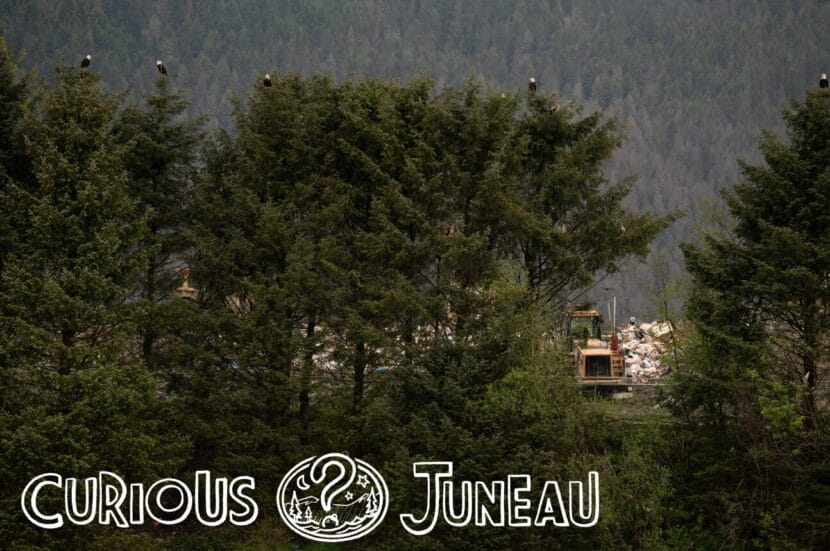Where do Juneau’s bald eagles go in the winter?
- Author
- KTOO Public Media
- Published
- Tue 03 Jun 2025
- Episode Link
- https://feeds.ktoo.org/link/20426/17044198/where-do-juneaus-bald-eagles-go-in-the-winter

Listen to this story:
On a sunny morning at the Lemon Creek Landfill, Steve Lewis, a wildlife biologist with the U.S. Fish & Wildlife Service, walks through the wetland toward the line of trees surrounding the dump. Bald eagles are squabbling over a big, salmon-colored plastic bag.
They congregate here to eat. He counts more than 20 eagles swooping around the trash piles.
“It’s just unfortunate, because it’s basically like an unnatural occurrence that mimics natural occurrence,” Lewis said. “This is pretty similar to what you might see at the Chilkat.”

He’s talking about the Chilkat Bald Eagle Preserve in Haines, where thousands of bald eagles from all over Southeast go in the winter to feast on a late fall run of chum salmon.
But that’s not where they all go.
For Curious Juneau, KTOO listener Mark Branson asked where Juneau’s bald eagles go in the winter, and what they eat.
“Eagles eat a lot of fish and they eat a lot of waterfowl — those are probably the two big things,” Lewis said. “But, you know, they’ll eat things at the dump here.”
Lewis outfits the birds with little GPS backpacks to track their movements. He said bald eagles go where the food is, including hooligan and salmon runs, areas where waterfowl hang out, places they can scavenge dead animals — and yes — landfills.
How far they travel for a meal depends on whether they’re going to have eaglets. Those who will be parents don’t go far.
“We have birds that stay here all year,” he said. “There’s territorial birds that have nests.”
Hundreds of bald eagles stick around Juneau through the winter, Lewis estimates. They feed on what they can find nearby so they can defend their territory from potential thieves and retain their nest to have eaglets in the spring.
But Lewis said that not all eagles are interested in breeding. Those birds travel to Haines and even farther.
“There’s adults that are not territorial,” he said. “We call them floaters. They have a little bit less affinity to necessarily staying in one place.”
Since bald eagles can live around 30 years, he reckons the floaters probably don’t feel a sense of urgency about reproducing. Instead, they can wait until the conditions feel right and roam along the coast and up rivers in the meantime.
Lewis estimates that 30% to 40% of adult bald eagles in Southeast are ‘floating’ in a given year. That’s not including juvenile eagles, which ‘float’ as well while they learn about their environment.
The young birds can be identified by their splotchy brown feathers. They develop the characteristic white head and tail plumage at around four years old.
Many floaters visit the Chilkat Valley near Haines, where an odd upwelling of warm water at the confluence of the Chilkat and Tsirku Rivers prevents the water from freezing and allows a late fall run of chum salmon to spawn. The salmon provide a feast for thousands of bald eagles starting in November.
Reba Hylton, the tourism director for Haines, said locals call it the “council grounds” since there are so many white heads poking through the trees like wigged legislators of old. She said the eagles are most active in the morning.
“They’re still lazy,” she said. “I mean, there’s plenty of food to go around, but they’ll still try and come in and take each other’s food. So you get a lot of squawking that happens.”
But Southeast’s floaters don’t just fly to Haines. Some bald eagles that Lewis tagged in Juneau, Sitka and the Chilkat Valley have traveled as far north as the Peel River in Yukon Territory and as far south as Vancouver Island, British Columbia.
He said their movement patterns look as if he put GPS tags on his friends.
“The church would be important for some, and the bar is important for some and the library is important for some,” Lewis said. “Eagles are kind of that way, I guess.”
For some bald eagles, the dump is important. In Juneau, it’s common to hear people refer to the national bird a trash bird or a “dump buzzard,” Lewis said. But he still finds them impressive, no matter where they like to hang out.
Curious Juneau
Are you curious about Juneau, its history, places and people? Or if you just like to ask questions, then ask away!

